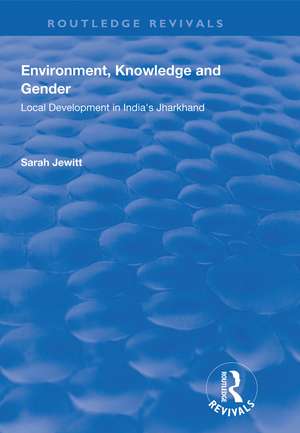Environment, Knowledge and Gender: Local Development in India’s Jharkhand: Routledge Revivals
Autor Sarah Jewitten Limba Engleză Hardback – 30 iun 2020
Din seria Routledge Revivals
- 9%
 Preț: 903.80 lei
Preț: 903.80 lei -
 Preț: 200.66 lei
Preț: 200.66 lei -
 Preț: 341.55 lei
Preț: 341.55 lei - 9%
 Preț: 767.40 lei
Preț: 767.40 lei -
 Preț: 381.17 lei
Preț: 381.17 lei -
 Preț: 374.02 lei
Preț: 374.02 lei - 9%
 Preț: 934.94 lei
Preț: 934.94 lei - 8%
 Preț: 418.23 lei
Preț: 418.23 lei -
 Preț: 342.36 lei
Preț: 342.36 lei -
 Preț: 200.18 lei
Preț: 200.18 lei -
 Preț: 256.94 lei
Preț: 256.94 lei -
 Preț: 294.53 lei
Preț: 294.53 lei -
 Preț: 258.66 lei
Preț: 258.66 lei -
 Preț: 368.93 lei
Preț: 368.93 lei -
 Preț: 258.66 lei
Preț: 258.66 lei -
 Preț: 286.98 lei
Preț: 286.98 lei -
 Preț: 326.26 lei
Preț: 326.26 lei -
 Preț: 616.29 lei
Preț: 616.29 lei - 9%
 Preț: 764.34 lei
Preț: 764.34 lei -
 Preț: 737.40 lei
Preț: 737.40 lei -
 Preț: 294.91 lei
Preț: 294.91 lei -
 Preț: 294.91 lei
Preț: 294.91 lei -
 Preț: 267.15 lei
Preț: 267.15 lei -
 Preț: 309.99 lei
Preț: 309.99 lei -
 Preț: 295.04 lei
Preț: 295.04 lei -
 Preț: 257.67 lei
Preț: 257.67 lei -
 Preț: 294.72 lei
Preț: 294.72 lei -
 Preț: 245.10 lei
Preț: 245.10 lei -
 Preț: 258.52 lei
Preț: 258.52 lei -
 Preț: 230.80 lei
Preț: 230.80 lei -
 Preț: 246.37 lei
Preț: 246.37 lei -
 Preț: 258.66 lei
Preț: 258.66 lei -
 Preț: 259.47 lei
Preț: 259.47 lei -
 Preț: 230.80 lei
Preț: 230.80 lei - 18%
 Preț: 695.85 lei
Preț: 695.85 lei -
 Preț: 315.88 lei
Preț: 315.88 lei -
 Preț: 153.81 lei
Preț: 153.81 lei - 9%
 Preț: 903.41 lei
Preț: 903.41 lei -
 Preț: 349.80 lei
Preț: 349.80 lei - 9%
 Preț: 1004.17 lei
Preț: 1004.17 lei -
 Preț: 308.78 lei
Preț: 308.78 lei - 9%
 Preț: 605.71 lei
Preț: 605.71 lei -
 Preț: 296.10 lei
Preț: 296.10 lei -
 Preț: 737.40 lei
Preț: 737.40 lei - 9%
 Preț: 606.35 lei
Preț: 606.35 lei - 9%
 Preț: 729.99 lei
Preț: 729.99 lei -
 Preț: 295.62 lei
Preț: 295.62 lei -
 Preț: 382.23 lei
Preț: 382.23 lei -
 Preț: 343.21 lei
Preț: 343.21 lei -
 Preț: 741.10 lei
Preț: 741.10 lei
Preț: 680.73 lei
Preț vechi: 914.36 lei
-26% Nou
Puncte Express: 1021
Preț estimativ în valută:
130.34€ • 133.70$ • 109.73£
130.34€ • 133.70$ • 109.73£
Carte tipărită la comandă
Livrare economică 26 februarie-12 martie
Preluare comenzi: 021 569.72.76
Specificații
ISBN-13: 9781138739802
ISBN-10: 1138739804
Pagini: 382
Dimensiuni: 152 x 229 mm
Greutate: 0.45 kg
Ediția:1
Editura: Taylor & Francis
Colecția Routledge
Seria Routledge Revivals
Locul publicării:Oxford, United Kingdom
ISBN-10: 1138739804
Pagini: 382
Dimensiuni: 152 x 229 mm
Greutate: 0.45 kg
Ediția:1
Editura: Taylor & Francis
Colecția Routledge
Seria Routledge Revivals
Locul publicării:Oxford, United Kingdom
Cuprins
Introduction; Changing ideologies in development thinking: the shift to a more appropriate approach; The adoption of gender issues into development and environmental policy making; Environmental management and forest policy in India; Gender and environmentally-oriented development in India; Introduction to Jharkhand and fieldwork methodologies; Introduction to the fieldwork villages; Technical and socio-cultural systems of agro-ecological knowledge in Jharkhand; Gender and agriculture in the research area; Forest use and management in the research area; Autonomous and joint forest management in Jharkhand; Gender, silvicultural knowledge and forest management; Conclusions; Bibliography; Appendices.
Notă biografică
Sarah Jewitt, School of Geography, The University of Nottingham, UK
Recenzii
’An important work which uses patient fieldwork to establish the variegated nature of institutional ecologies in Jharkhand and which robustly challenges the more reductive approaches of rural populism and ecofeminism.’ Stuart Corbridge, Professor of Geography, LSE, UK and Professor of International Studies, University of Miami, USA ’Women’s role in nurturing local knowledge about farming and forests and the connections between traditional and modern technology, have both become crucial themes in studies of development and globalization. What Sarah Jewitt does in this path breaking study is to put flesh on to the bones of this debate. In so doing she dispels much of the myth and sentimentality which has clouded our academic views about gender and the environment.’ Tim Bayliss-Smith, Senior Lecturer, University of Cambridge, U.K ’Sarah Jewitt has usefully brought experiences from...different research fields into correspondence with development research in her book...Environment, Knowledge and Gender is a strong argument against not only eco-feminism but against all analyses that tend to romanticise tribal people in the forests as noble and eco-friendly, gender-balanced savages...the book is an important contribution to debates on local development in resource-poor forest regions.’ Geografiska Annaler, Series B, Human Geography ’...interesting in its own right...but far more significant in its attempt to explode the myth of ecofeminist and populist models of development...In my opinion she has succeeded in showing that the ecofeminist, populist approach is romanticized and undifferentiated...’ Ecotheology
Descriere
First published in 2002. Tracing global shifts in development thinking through to policy making in India , Sarah Jewitt employs detailed empirical data to investigate the practical value of radical populist and eco-feminist alternatives to more mainstream forms of development.
